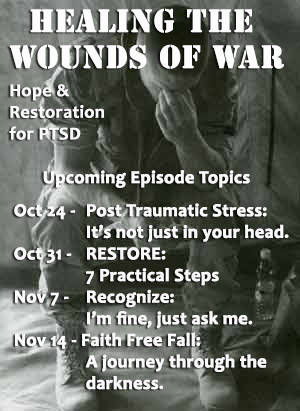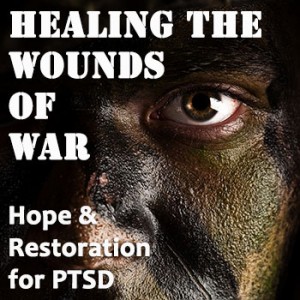Four years ago hundreds of lives were directly impacted by this act of terror. For many the pain of this day is still very real. Yet, our resolve is strong. Perhaps even stronger than before this attack! Individually, and as a group, we do not have to allow the evil actions of others keep us down. Today, If you have the opportunity, (better yet, make the opportunity) thank the men and women that courageously stand against evil in this world.
The following is from a posting I wrote shortly after the shooting–while I was stationed at Fort Hood:
It is normal, and even healthy, to experience outrage, anger, fear and a whole host of powerful emotions. Some may experience suspicion of Muslims and even hatred. It is important to acknowledge how this affects us and the emotions and thoughts an event like this brings to the surface.
Two tours in Iraq and multiple destructive encounters (combat) with those waging war on us have taught me the pains of war. I have also spent hundreds of hours counseling and caring for Soldiers during and after combat operations. Sometimes simply listening and at other times helping put the pieces of their torn lives and souls back together. War and violence result in a complex emotional response. Their effects are long lasting and profound.
When this event happened so close to home some of these old emotions surfaced to the forefront of my mind. Past experiences relived as if they were recent events. So close to home, so close to my family and friends. To make it a little closer to home, this is a man that I have met and offered my hand in friendship, a man that I directly helped support his religious liberties, a man that wore the same uniform and took the same oath of office as I took when I accepted a commission as an officer in the US Army.
There is no quick fix to the pain and grief that follows violent events. The hurt and impact of this despicable display of violence will be with many people for a very long time.
As followers of Christ we are not immune to the above mentioned emotions nor are we immune from the desire for revenge. What are we to do?
Recovery starts with allowing ourselves the opportunity to grieve. This is a process and it takes time. It often should involve talking to someone who understands this process—such as a pastor, chaplain, counselor, etc.–to help you move through the process. It is easy to get stuck in the anger aspect of grief and never move beyond that natural component of the grieving process.
Over the past few days I have heard many express a desire to personally exact revenge on Mr. Hasan. This is not uncommon following such an event. Similar, but less specific, talk also takes place concerning anyone who may be of the same faith or ethnicity. People are expressing their anger, grief, frustration and fear. Sadly, some do not really move past this part of the grief process.
As followers of Christ we are commanded, not suggested, to love our enemies, pray for our enemies and forgive those who have wronged us. Ouch! This is not easy; nor does it just happen. It takes courage, lots of courage, great strength, and time. Nevertheless, it is not an option, we must forgive, love and pray for our enemies (I must admit, it was not emotionally easy for me at church today when Fr. Paul lead us in a prayer for Maj. Hasan). And in His grace, he provides us with everything we need to accomplish the process.
Holding on to anger beyond its role in processing grief will hurt us, even consume us, and rob us of the joys of living. So what does forgiveness look like?
Forgiveness is complex. It may be easier to first consider what forgiveness is not.
Forgiveness is not “forgive and forget”. That sounds more like denial or thought repression. It does not release the one who has wronged us from the responsibility or consequences of his/her actions. People must be accountable for their deeds. Forgiveness does not mean that trust is automatically, or ever, restored. It does not mean that new opportunities are given to the offender to trample on or destroy us or those we love.
Forgiveness is a process. It can be painful because it forces us to acknowledge how we have been hurt, how we have been violated, what has been taken away from us, what we have suffered! It is not something that just happens in our hearts at the moment we want it to happen or when we say the words “I forgive you”. Forgiveness releases the offender of the burden he/she owes you personally. You no longer require or seek for the offender to suffer as a result of what they have done. It also releases us from carrying the burden of revenge or requiring payback. It releases us to continue the grieving process and the healing process—the healing process of our soul and mind.
If we do not grow into forgiveness, our hearts, minds, judgments and perceptions grow clouded. We lose the joy of living and our ability to see the beauty and goodness in creation.
Forgiveness also affects how we will be forgiven. In the familiar Lord’s Prayer Jesus taught his disciples to pray, “Forgive us our sins as we forgive those who sin against us.” (Matthew 6: 12). And just in case we did not get the message he continues after the prayer, “If you do not forgive men their sins against you, your heavenly Father will not forgive your sins.” (Matt. 6:14)
As Christians we must handle those who are struggling with anger and forgiveness with grace and love. We are to patiently bear one another’s burdens, realizing that each is dealing with these issues carrying different baggage; and each will grow at a different pace.
The goal of this posting is not to solve the complex problem of anger and forgiveness that results from this or other tragedies—volumes have been written on these subjects; but rather to simply open the door toward the eventual journey of healing and restoration. There is hope for our souls to be at peace and for our hearts to be mended. It is not easy and it takes time and effort, but it can happen.
Perhaps you have experienced a deep hurt at the hands of another, or perhaps God will bring someone across your path who needs a patient, loving, grace filled companion on their journey through grief and forgiveness. Whatever the case, God has not left us alone. He has left us with the Holy Spirit, His Word, the Sacraments and yes, each other.
 I set my eyes on the stunning beauty all around me. The rich blue sky dotted with shades of white and gray clouds. The sunlight filtered through the 120+ feet tall trees and inspired me to take a deep breath. The aroma of Christmas trees further drew my attention to the beauty of my surroundings. Thoughts of gratitude started to occupy my mind. The fresh cool air and the warm sunshine refreshed me in unexpected ways.
I set my eyes on the stunning beauty all around me. The rich blue sky dotted with shades of white and gray clouds. The sunlight filtered through the 120+ feet tall trees and inspired me to take a deep breath. The aroma of Christmas trees further drew my attention to the beauty of my surroundings. Thoughts of gratitude started to occupy my mind. The fresh cool air and the warm sunshine refreshed me in unexpected ways.

